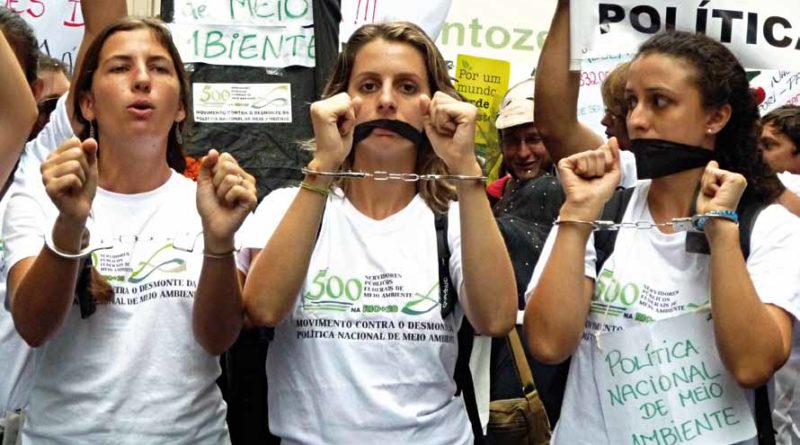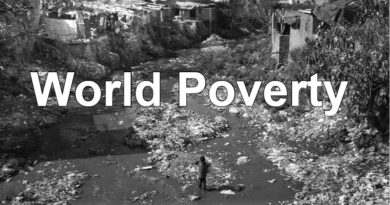Green economy is an enemy
Regression of RIO + 20
By Stefano Mannacio
The Rio Conference on Sustainable Development of the United Nations was the culmination of a mystification process, ideological and cultural, unprecedented. Although there is not the slightest doubt that sustainable development is a harmful concept, an oxymoron or an antinomy, and that Green Economy is just a new tool at the service of industries of monopolistic or oligopolistic nature (transport, engineering, energy, computer science), the Final Document of the Conference wanted to locate in this theoretical model, the future pillar for economic development. No commitment or plans for Governments or Agencies.
The Conference hasn’t been only the failure of a journey begun twenty years ago, but also the authoritative establishment of the leader country, with the help of other countries members of the Conference Bureau playing their part too; These countries have done their best to celebrate the private sector of Green great industries to which, through a wave of pseudoscientific and palliative remedies, of green inefficient technologies and obscure public funding, it is demanded to solve the world problems, poverty, starvation, reduction of biodiversity, desertification, climate change, deforestation, water and waste.
Green Economy, in the Conference preached as a re-evangelization, enhances the idea of “one way” technologic transfer, while the industries make their business by introducing on the market products with almost no energy, technical and social efficiency, passed off as bastions of ecological protection. Green Economy is responsible for ecological and economic degradation because, putting on the market products without social, energy and environmental return, i.e. waste, it dramatically increases entropy of life processes.
“Green” enhancement has invaded every aspect and moment of the Congress, it has withered away and made scientific research sterile, it has cancelled the valuable references to human rights and indigenous peoples, to holistic and interdisciplinary knowledge of environmental issues and the proper use of resources, that were excluded from the debate, as well as the problems of economic crisis (rather financial), employment, ecological crisis and resources.
Even the choice of placing a distance of tens of kilometers far from the different locations of the Conference, made the Summit a kind of tourist sideshow for Rio de Janeiro and not the center of high-level cultural, scientific and technical debate, that however has never been there . NGO were held off from the governments plenary. Access was forbidden even to those with accreditation badges and to enter it was necessary to have a further pass, distributed only to duly chosen “friends” by NGO representatives. And the so-called “dialogues”, invented as sites of open confrontation, became soon a fair of banalities, in which the public, knocked up and illiterate, voted – with an electronic technology worthy of a television quiz, intended for democracy – the hints to give to the governments, choosing by majority one of the ten hypothetical problems that were subject to subsequent approval of presumed experts-clowns chosen by the same governments under the careful control of numerous police.
In fact there have been some protest attempts against this monocultural approach to ecological and development problems, but the overall management of the Conference has shaped manu militari dissent, by integrating it, de facto, as part of the approval. Anyway, only a heavy-handed media manipulation strategy, funded for years by the public and private sectors, has been able to convince the general public that low energy efficiency technologies are able to improve environmental quality and even the quality of life and could impose scientists, politicians, NGO, agencies, media, a monocultural model that celebrates with “Green” a generic and highly imaginative “positive thinking (because I am alive, because I am alive)” as some inexperienced young people (especially Europeans) repeated! All of them should be asked if it is possible to debate seriously about “sustainable and renewable energy” up to imagine the world entirely covered by solar panels, wind vanes, Green highways!
Green Economy and Green industry, together with the Green associates, ignorant and obtuse, that support them, represent a veritable cultural and environmental misfortune because of the mystification that they fuel: a disgrace that has been claiming for years that there is a “green” way to solve environmental and resource problems within the same system that produced them, which is obviously false; a disgrace that would like to contrast decline with growth while they are two aspects of the same fake problem.
What does RIO + 20 leave? To answer anything is optimistic. Rio + 20 leaves more regression compared to twenty years ago: at that time, unlike today, the high-level scientific debate, led to the drafting of guidance tools, still in use, such as Agenda 21 or the Convention about Biological Diversity; at that time the world of Non-governmental Organizations, unlike today, was considered independent and free from the Governments’ authority; it provided critical insights and influenced negotiations, agreements, final documents; and, what is worse, the rights of indigenous peoples , being recognized, had not yet been reduced to a marginal aspect, not to say folklore, of the scientific debate on the one hand, of humanity, on the other.
And Italy? It gave its full support to promotion, with a magnificent Pavilion and a large delegation, composed of ministers, industrialists, and NGO all together, under the centralized leadership of the Ministry of Environment.
What to do to counteract this discouraging contest?
For example, create kind of incompatibility constraints and barriers to prevent damaging intermingling among NGO, Governments and Industries; create independent financing channels to allow NGO’s involvement in the U.N. activities on the basis of proposals made known during Eventi Paralleli; call an International Conference to draft a Convention on Bio-economy and Sustainability. One last proposal, of institutional nature, concerns the Ministries of Environment that seem to be inadequate to their social role: structures that are economically too weak for being immune from private interests and too big for leaving management space to the Ministries of Agriculture, of Economic Development and Foreign Affairs. On the other hand, the question is, what does the action of safeguarding the green areas protected by green economy have in common with the sale of unnecessary electric cars?. Lets abolish, then, the Ministries of Environment, reduced to be business committees, that are among the main authors of the reiterated mystification of the concept of sustainable development and green economy and of the dangerous regression of Rio + 20 Conference.
All rights reserved




